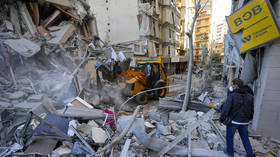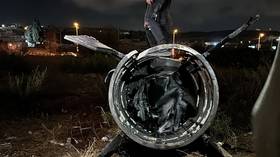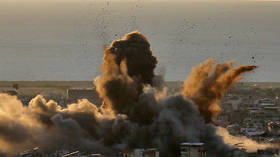Israel claims huge Hezbollah gold find

Israel has pinpointed a bunker allegedly containing hundreds of millions of dollars in Hezbollah gold and cash beneath a major hospital in the Lebanese capital, an Israel Defense Forces (IDF) spokesperson, Daniel Hagari, has claimed.
The statement came as Israel launched a series of airstrikes on Beirut, targeting the Al-Qard Al-Hassan Association – a banking system it claims is operated by the Lebanese-based Hezbollah movement.
“The Israeli Air Force carried out a series of precise strikes on these Hezbollah financial strongholds,” Hagari said in a statement on Monday, adding that the attacks aim to degrade the group’s ability to finance its attacks on Israelis.
The IDF has struck one underground vault beneath a residential building, which held millions in cash and gold, he claimed. However, another major target that has yet to be struck is a bunker supposedly belonging to late Hezbollah chief Hassan Nasrallah, who the IDF killed in late September, the spokesman added.
The vault is reportedly located “directly under El Sahel Hospital in the heart of Beirut in Dakhia,” Hagari claimed, adding that there are “hundreds of millions of dollars in cash and gold inside the bunker right now.”
The regional UN human rights office condemned the recent Israeli bombardments of Beirut and southern Lebanon, aimed at “facilities affiliated with the Al-Qard Al-Hassan financial association.” The attacks caused “extensive destruction to residential properties and civilian infrastructure,” as well as “indescribable panic and another wave of displacement among residents of those areas,” the UN Human Rights Office in the Middle East and North Africa stated on Monday.
Under international humanitarian law, “objects that contribute economically or financially to the war effort of a party to a conflict” cannot be declared a legitimate target and lawfully attacked on that basis alone, the UN body said.
Hezbollah and Israel have routinely exchanged fire since October of last year after the Lebanese movement announced solidarity with the Palestinians following the outbreak of the war in Gaza. In late September, West Jerusalem announced a new phase of the war and expanded operations against Hezbollah, stating that it would make northern Israel safe from the militant group’s strikes.
The IDF launched a bombing campaign and “limited” ground incursion into Lebanon following a series of handheld electronics explosions that killed dozens and injured thousands across the neighboring state. While Israel has neither confirmed nor denied involvement, the operation is widely believed to have been orchestrated by Israeli intelligence.
According to the Lebanese Health Ministry, nearly 2,500 people have been killed by Israeli attacks on Lebanon as of Saturday.














